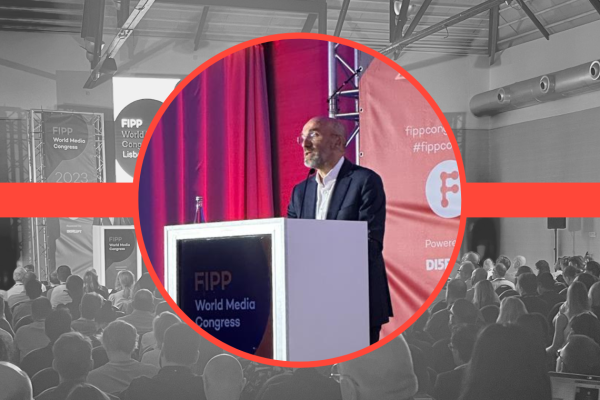Andrii Vdovychenko of Burda Media Ukraine talks about the perils of publishing during the Russian invasion
Andrii Vdovychenko, CEO of Kyiv-based Burda Media Ukraine, received a rapturous standing ovation from delegates at the FIPP World Media Congress as he revealed the bravery journalists have shown to keep publishing amid bombing raids and black outs.
Despite having its warehouse bombed and staff working apart and often not being able to connect to the internet, Vdovychenko and his team have persevered, producing crucial content that help their fellow Ukrainians survive the Russian invasion.
Thanking the donors who’ve kept the media industry going in Ukraine, Vdovychenko pleaded for international support to continue.
“Not only for independent media, but even more so for our army that fights on the battlefield against the enemy, not just for the liberty of Ukraine, but also for the democracy and the stability of the whole world which will not only continue, but will become even stronger,” he said.
Describing the dire situation in Ukraine, Vdovychenko said the sound of air raid sirens have become common place.
“Since the beginning of the invasion our Ukrainian brains have heard that sound more than 25,000 times,” he said. “Our nation will be dealing with the effects of post traumatic stress disorder for generations to come.”
Talking about the sort of peril his workforce has faced, Vdovychenko revealed how two of his warehouse workers were trapped in a small town 15km outside of Kyiv after it was occupied by Russian soldiers.
“They had to hide and survive there, having no possibility to run away,” he said. “They faced the danger of being discovered by Russian soldiers and being killed. Luckily, they survived this traumatic experience. Now our warehouse is working again and started deliveries of magazines to the newsstands in May 2022.
“I’m very proud that Burda Media Ukraine was the first publisher in Ukraine to start printing again after the invasion on 24 February 22.”
Publishing during the invasion
If the first three months after Russia invaded Ukraine, Vdovychenko focused on two things – supporting his team with money regardless of where they were working from, and to keep writing digital content to “retain an existential dialogue” with Burda Media Ukraine’s readers.
“Imagine most of our people are either abroad or have had to flee to another region within Ukraine. The warehouse is partly destroyed. We had huge debts and very limited cash,” he explained.
“However, we knew we had to act quickly and vigorously in order to have any chance for the business to survive. Survival was important so that I would be able to continue paying salaries to my team and also to provide messages of hope and courage to audience through our trusted media brands.”
Vdovychenko first steps were to collect all unsold stock and redeliver everything to the market and to close all the Burda Media Ukraine titles that had low or negative margins, focusing on six periodicals instead of 27. Figures show that the company’s is now well on the road to recovery after the depths it hit during the early months of the invasion.
The bigger picture
Also speaking on behalf of the Ukrainian Media Business Association which unites 600 publishing brands across the country, Vdovychenko explained how a regular day in the life of a local publication includes working in a building scarred by bombs and using a generator to keep the printing process going.
“This is just one of hundreds of cases happening in Ukraine today,” he pointed out saying that the biggest challenges for the media industry in the country are a lack of cash for operational expenses, missing assets because they have been destroyed or are on occupied territory and missing knowledge on how to create a profitable digital business.
Over the last 15 months the Ukrainian Media Business Association has been able to coordinated donor support and collect over the 10 million Ukrainian agreements for donor money, which is equal to around €250,000.
“With this money, we helped 90 different media organisations with financial support and have organised seminars where about 100 publishers attended. Well-known media experts shared with us their valuable knowledge in ideas on how to innovate and restructure business in times of crisis for all publishers, and not only in Ukraine.
“Thanks to those measures we can say that more or less 300 journalist jobs have been saved and 20 million Ukrainians have been able to access journalistic product.”










